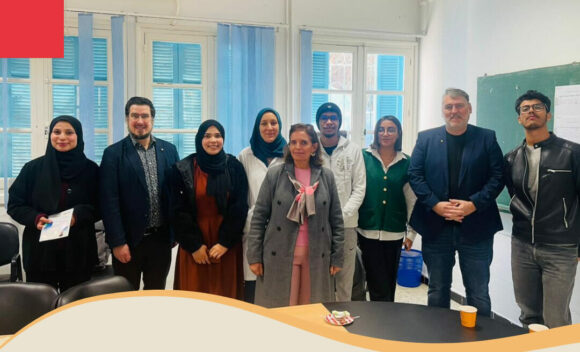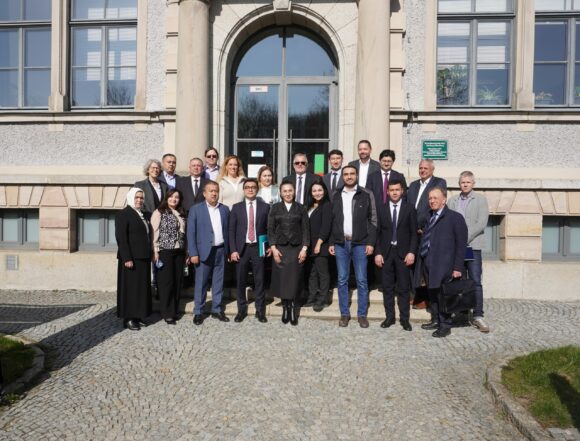It was “sweaty” in the truest sense of the word, but also successful: in constant temperatures of 35 to 40 degrees Celsius, a three-person delegation from Hof University of Applied Sciences visited facilities at the University of Sao Paulo. It is one of the largest and most prestigious universities in Latin America. At the School of Engineering in Sao Carlos, theSchool of Public Healthand theSchool of Nursing, the two deans Prof. Dr. Ing. Anke Müller and Prof. Dr. Gerald Schmola and Prof. Dr. Christoph Koch established contacts and prepared a new double-degree program. Prof. Dr. Koch himself was an exchange student at USP 15 years ago (“campuls-digital” reported) and initiated the cooperation.

University of Sao Paulo at the Sao Carlos site; Image: Hof University of Applied Sciences;
Prof. Müller, have you already got used to the temperatures in Hof again?
AM: “With temperatures currently just above 0 °C in Hof and recent snowfall, it’s obviously a bit difficult. But engineers can get through that too, of course.”
What was the aim of the trip?
AM: “Our destination was the University of Sao Paulo, which, due to its sheer size with around 90,000 students, is currently spread across seven campuses in the entire state of Sao Paulo. As we had completed an exchange program with USP during International Teaching Week in May of this year, we wanted to take a look at the exact possibilities on site and also establish a personal connection with our colleagues. As we discovered, this is particularly important in Brazil. Coffee and extensive small talk before appointments were always a must and helped to slow down the typical German idea of efficiency.”
Prof. Koch, which facilities of this huge university were you able to visit?
CK: “We first spent three days in Sao Carlos, where the School of Engineering is based. We were welcomed there by 39 °C and Prof. Fernando César Almada. In Sao Carlos itself, there are two huge campuses with an incredible number of large laboratories, which are particularly interesting for our engineering courses at the ING faculty. They even have an airplane hangar there…”

University of Sao Paulo has its own aircraft hangar – the Hof travelers were allowed to sit in old planes for fun;
Picture: Hof University of Applied Sciences;
…and then Prof. Schmola joined us, right?
GS: “Yes, in the second half of the week we went to Sao Paulo City for two days and were able to visit the School of Public Health and the School of Nursing. Both institutions are particularly interesting partners for our INWISS faculty.

Ferreira Antunes (far left in the picture) and Prof. Dr. Gerald Schmola, who joined the group
Schmola; picture: Hof University of Applied Sciences;
During the discussions, we were able to establish good contacts with various experts in the healthcare sector. The subject areas were very diverse and therefore fit in well with our current teaching and research focus on Innovative Healthcare, Smart Society and Cross Cultural Nursing Practices. Finally, we were able to fit in a little sightseeing in Sao Paulo and then it was time to head back.”
So the cooperation agreement with USP is to be built on immediately in several fields..
AM: “Yes, exactly. During the Brazilian delegation’s visit in May, we immediately planned a return visit to Sao Paulo for November. We intend to facilitate a double degree agreement for engineering. Cross-faculty trips abroad also generate numerous ideas for further interdisciplinary cooperation.”

with Hof University of Applied Sciences; Image: Hof University of Applied Sciences;
We hear that the hosts had prepared an extensive program?
CK: “Oh yes, the program was tightly organized, especially on the first two days. One Brazilian participant said: “That’s quite a German schedule.” That was great for us, of course, as we were able to gain as many impressions as possible and make lots of interesting and valuable contacts. Our 30 business cards were distributed on the second day. It’s worth mentioning that Wednesday was a Brazilian public holiday, but we still had a really great event with various student initiatives. Almost 60 students were on campus on their day off and introduced us to the various Formula Student teams in the off-road, motorcycle, EV and combustion engine sectors, among others. They came to us to find out about the opportunities for student exchange. The students told us that we were apparently not seen as “typical German professors”. We decided to take that as a compliment.”
That sounds very productive. What steps and developments can we now expect?
AM: “First things first: in the coming summer semester, the first two Brazilian students who are involved in Formula Student in Sao Carlos will be coming to Hof for an exchange semester.
A program like this thrives on the mobility of students and professors. Hence the appeal to our students: Seize the opportunity now to gain lasting experience at a very good university in an exciting country. The same applies to the teaching staff and researchers at our university.”
Prof. Dr.-Ing. Anke Müller
CK: “Joint publications and smaller research projects are currently being planned. We would also like to deepen our formal collaboration. Prof. Anke Müller is currently in talks with her counterpart on the Brazilian side. So there could still be something to come.”
Are there similarities between such a large institution and our rather small university?
CK: “Oh yes. Despite the differences in size, we noticed a surprising number of similarities during our visits to the various departments. The teaching there is also characterized by rather small groups and has a high proportion of application-oriented components, such as student projects or laboratory work. We also noticed some similarities in terms of the atmosphere on campus. In Brazil, it is perhaps a little more relaxed overall, but we try to keep up in Hof.”
What impressions do you take away from the trip and the country itself, Prof. Müller?
AM: “Definitely not enough of the country! The city of Sao Paulo is incredibly large and very diverse: there are Japanese and Italian influences in the cityscape and the cuisine, but it is also a city of extreme economic contrasts. The School of Engineering has therefore also been relocated to a quieter town, Sao Carlos. Sao Carlos is characterized by two very large universities and, with a population of 250,000, is comparatively manageable in size. The atmosphere on campus is relaxed, but the people in charge there are also self-confident. After all, USP repeatedly achieves top positions in national and international rankings in various categories, including engineering. They are rightly aware of this. At the same time, all professors, staff and students without exception were very open and approachable towards us and made us want to work together more intensively.”
Thank you very much for the interview!





















